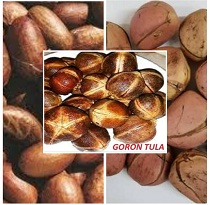Peanuts Nutrition, Health Benefits, Uses. & Side Effects
Peanuts Nutrition, Health Benefits, Uses. Types, & Side Effects. Please watch >>>

Peanut (Arachis hypogaea), commonly known as groundnut, earthnut, or goober, is a legume in the pea family (Fabaceae) farmed for its edible seeds.
Peanuts offer protein, vitamins, minerals, and antioxidants. They may provide additional health benefits, such as boosting fullness and aiding in the prevention of heart disease.
Peanuts (Arachis hypogaea) are a type of legume native to South America. They go by several names, and despite their name, are not related to tree nuts. They are linked to beans, lentils, and soy as legumes.
Peanuts are available in a variety of forms, including roasted, salted, chocolate-coated, and peanut butter. Different varieties have various nutritional profiles and health benefits.
In addition to having a healthy nutritional profile, groundnuts are a high-calorie food, hence they are best consumed in moderation.
Groundnuts are rarely eaten uncooked in the United States. Instead, they are most commonly consumed roasted or in the form of peanut butter.
Other peanut products comprise peanut oil, flour, and protein. These goods are found in a wide range of cuisines, including sweets, cakes, confectionery, snacks, and sauces.
Peanuts are high in protein, fat, and other healthy nutrients. According to research, peanuts can help with weight loss and are connected to a lower risk of heart disease.
This article will teach you all there is to know about peanuts.
What are the Nutritional Benefits of Peanuts?
Peanuts Nutritional Facts
Peanuts have a high protein, fat, and fiber content. While peanuts contain a lot of fat, the majority of the lipids they contain are regarded as “good fats,” which help lower your cholesterol levels.
The following are the nutritional values for 3.5 ounces (100 grams) of raw peanuts:
- 567 calories
- Water: 7%
- Protein: 25.8 g
- Carbohydrates: 16.1 g
- Sugar (4.7 g)
- 5 grams of fiber
- 2 g of fat >>>
- Saturated fat: 6.28 g
- Monounsaturated fat: 24.43 g
- Polyunsaturated fat: 15.56 g
- Omega-3 fatty acids: 0 g
- Omega-6: 15.56 g
- Trans: 0 gm
Peanut Nutritional Analysis
100 grams of raw peanuts provide 567 calories and the following nutrients in grams (g), milligrams (mg), or micrograms (mcg), according to the United States Department of Agriculture (USDA):
| macronutrients | protein carbohydrate fiber sugars |
25.8 g 16.13 g 8.5 g 4.72 g |
| fats | monounsaturated fats polyunsaturated fats saturated fats |
24.43 g 15.56 g 6.28 g |
| minerals | potassium phosphorous magnesium calcium sodium iron zinc |
705 mg 376 mg 168 mg 92 mg 18 mg 4.58 mg 3.27 mg |
| vitamins | vitamin B-3 (niacin) Vitamin E (alpha-tocopherol) The vitamin B-1 (thiamine) vitamin B-6 (pyridoxine) riboflavin (vitamin B-2) folate (vitamin B-9) |
12.07 mg 8.33 mg 0.64 mg 0.35 mg 0.14 mg 240 mcg |
Peanuts give nutritional advantages and make a person feel satisfied for longer due to their combination of healthy fats, protein, and fiber.
When compared to chips, crackers, and other simple carbohydrate items, this makes peanuts a healthy, go-to snack.
The benefits of important nutrients found in peanuts are discussed further below.
Fat in peanuts
Peanuts contain a lot of fat.
They are, in reality, classed as oilseeds. A significant amount of the world’s peanut harvest is utilized to produce peanut oil (arachis oil).
The fat content ranges from 44-56% and is mostly made up of mono- and polyunsaturated fat, the majority of which is oleic and linoleic acids.
Peanut proteins
Peanuts are a high-protein food.
Peanuts are a good source of plant-based protein because their protein level ranges from 22-30% of their total calories.
Some people are extremely allergic to the most abundant proteins in peanuts, arachin, and conarachin, which can cause life-threatening reactions.
Carbs
Peanuts are low in carbohydrates.
In actuality, carbohydrate content is just about 13-16% of total weight.
Peanuts have a very low glycemic index (GI), which is a measure of how quickly carbs enter your system after a meal since they are low in carbs and high in protein, fat, and fiber.
As a result, they are suitable for diabetics.
Minerals and vitamins
Peanuts are high in a variety of vitamins and minerals, including:
- Biotin is a B vitamin. Peanuts are one of the best sources of biotin, which is essential during pregnancy.
- Copper, a trace mineral, is frequently deficient in the Western diet. Deficiency may hurt heart health.
- Niacin, often known as vitamin B3, serves several critical activities in the body. It has been related to a lower risk of cardiovascular disease.
- Folic acid. Folate, often known as vitamin B9 or folic acid, is an essential nutrient that is especially crucial during pregnancy.
- Manganese is a mineral. Manganese is a trace element found in drinking water and most foods.
- Vitamin E. A potent antioxidant, this vitamin is commonly found in high concentrations in fatty meals.
- Thiamine is a B vitamin. Thiamine, a B vitamin, is sometimes known as vitamin B1. It aids in the conversion of carbohydrates into energy in your cells and is required for the proper functioning of your heart, muscles, and neurological system.
- Phosphorus is a mineral. Peanuts are high in phosphorus, a mineral that is necessary for the growth and maintenance of bodily tissues.
- Magnesium is a mineral. Magnesium, an essential dietary element with numerous critical activities, is thought to protect against heart disease.
Peanuts Nutrition ~ Peanut Properties:
Groundnuts may have the following characteristics:
- It may possess antioxidant qualities.
- It may have anti-cancer properties.
- May have cardioprotective effects.
- It may aid in the reduction of diabetes.
- Aid in blood pressure reduction.
Health Benefits of Peanuts
Many people feel that peanuts are not as nutritionally valuable as tree nuts such as almonds, walnuts, or cashews.
Peanuts, on the other hand, have many of the same health benefits as more expensive nuts and should not be neglected as a nutritious diet.
Reduce Your Diabetes Risk
Peanuts are a low-glycemic food, which means they won’t cause an increase in blood sugar levels.
Eating peanuts has been found in studies to reduce the risk of type 2 diabetes in women.
Reduce Inflammation
Peanuts are high in fiber, which helps to reduce inflammation throughout the body and benefits the digestive system.
Cancer Prevention
Eating peanut butter may help lessen the chance of acquiring a type of stomach cancer called gastric non-cardia adenocarcinoma in older individuals, according to research.
Other peanuts health benefits include;
- Cardiovascular Health
- Weight Management
- Increased Life Expectancy
Which types of peanuts are the healthiest?
Raw peanuts are the healthiest type. Peanut butter is an excellent choice, with a balanced nutritional profile and numerous health advantages.
People can also purchase roasted and salted peanuts. taking these sorts in moderation is fine, but taking too much sodium has been related to high blood pressure and heart disease.
The American Heart Association (AHA) recommends no more than 1,500 mg of sodium per day and no more than 2,300 mg of sodium — comparable to 1 teaspoon of salt — for patients with high blood pressure.
Choose raw peanuts with the skin attached whenever possible. Antioxidants can be found in peanut skins. Antioxidants serve to protect the body’s cells from free radical damage. Most roasted or salted peanuts are sold with their skins removed.
Peanuts and peanut butter can be consumed in moderation as a snack throughout the day. Peanuts are an excellent complement to salads and Thai cuisine.
How to Prepare Peanuts ~ How to Use Peanuts
Raw, blanched, roasted, boiled, fried, powdered, or processed into peanut butter, peanuts can be eaten in a variety of ways.
The skin contains many antioxidants and phytochemicals, thus eating them with their thin, papery skin is the most nutritionally advantageous.
Including more peanuts in your diet is simple, whether you use whole peanuts or peanut butter.
Here are some recipes that incorporate peanuts:
- Peanuts can be baked into cookies or pies.
- Make a sandwich with peanut butter and a banana.
- Mix in some peanut butter to the hummus.
- Sprinkle peanuts on top of your yogurt.
- Toss peanuts into your salad.
- Stir peanuts into your stir fry or noodles.
- Combine peanuts with trail mix.
- Spring rolls dipped in Thai peanut sauce.
Side Effects of Peanut
Peanuts have the following common side effects:
Allergies: Certain people may be allergic to peanuts, and the exact cause of the allergy is unknown. However, peanut cotyledons may contain allergenic components.
The following symptoms may be observed:
- Dyspepsia
- Increased skin itching (atopic eczema flare)
- Facial, lip, throat, and skin swelling (angioedema)
- Vomiting
- Asthma
- Anaphylactic reaction
- Skin rashes or raised red lumps (urticaria or hives)
- Food poisoning: Peanut contamination by the fungus Aspergillus flavus is frequent, and eating such contaminated peanuts may result in food poisoning.
Precautions When Consuming Peanuts:
You should exercise caution when consuming peanuts because they can produce the aforementioned negative effects.
As a result, before consuming peanuts, be sure you are not allergic to them.
Interactions with Other Medications:
More research is needed to investigate the possible interactions of peanuts with other medicines.
As a result, you should check with your doctor to see if it is safe for you to consume peanuts, especially if you are taking drugs or undergoing treatment.
FAQs on Peanuts Nutrition
Is it healthy to eat peanuts? Is peanuts good for health?
Peanuts are both popular and nutritious. They’re a great plant-based protein source that’s also abundant in vitamins, minerals, and plant components.
They can be beneficial as part of a weight loss diet and may lower your risk of heart disease and gallstones.
What are the top five advantages of peanuts?
As described below, peanuts have numerous health benefits.
- Heart health.
- High protein content.
- Aids in weight loss.
- Sharpens your brain.
- Solid bones.
- Healthy
- Enhances vision.
- Lowers the risk of cancer.
What are the benefits of groundnuts in the body?
Groundnuts are high in vitamins and minerals such as vitamin E, magnesium, folate, copper, and arginine.
Furthermore, the protein-rich nature of groundnut makes it ideal for persons seeking to reduce weight or increase muscle strength.
What’s the difference between groundnut and peanut?
Groundnut is a member of the Fabaceae family, subfamily Faboideae, tribe Aeschynomeneae, and genus Arachis. Groundnuts come in a variety of varieties.
In contrast, peanut is a common name for the bean Arachis hypogaea, which is also a member of the Fabaceae family.
Are groundnuts also known as peanuts?
Peanut (Arachis hypogaea), commonly known as groundnut, earthnut, or goober, is a pea family (Fabaceae) legume produced for its edible seeds.
The peanut, which is native to tropical South America, was first introduced to the Old World tropics. The seeds are a nutritionally dense food, rich in protein and fat.
Are peanuts considered a vegetable or a nut?
Most nuts are fruit seeds, although real nuts, such as chestnuts, acorns, and hazelnuts, are fruits in and of themselves.
Peanuts are an exception because they are legumes, which are technically vegetables.
Why are peanuts referred to as groundnuts?
The word “peanut” is misleading because it is a legume rather than a genuine nut.
In many English-speaking nations, peanuts are also known as groundnuts because the edible seeds of a peanut plant begin above ground but mature beneath.
What are the two types of peanuts?
Peanuts in the United States are classified into four types: Runner, Virginia, Spanish, and Valencia.
Each of these peanuts is unique in terms of size and flavor.
Is peanut oil the same as groundnut oil?
Peanut oil, also known as groundnut oil or arachis oil, is a type of cooking oil made from peanuts.
It typically has a light, nutty flavor. It is a popular choice for frying and baking due to its high smoke point of 444.92°F (229.4°C).
Peanut oil accounts for about two-thirds of the world’s peanut production.
Effects of peanuts on females ~ The benefits of peanuts sexually for females
- Fiber. Peanuts are legumes.
- Fighting signs of aging. Resveratrol is the phenolic compound found in wine.
- Improving energy.
- Longevity
- Sexual function
- Heart health
- Lowering the risk of type 2 diabetes
- Supporting weight loss
Is it safe for a woman to consume peanuts?
In a study of nearly 30,000 postmenopausal women, those who ate nuts and seeds more than four times per week had a 40% decreased risk of mortality from coronary heart disease.
This demonstrates how incorporating a modest amount of peanuts into your diet can have a significant influence.
Benefits of peanuts sexually
Peanuts are also high in resveratrol, an antioxidant that has been proven to improve men’s sexual health.
Some human and animal research suggests that resveratrol may also increase sperm quality and erectile performance.
Are dry-roasted peanuts healthy?
“The skins contain a lot of polyphenols,” explains Malik. “We know that polyphenols are anti-inflammatory and good for health,” says Harvard Medical School, adding that eating them raw or dry-roasted rather than blanched (which removes the skin) is ideal. Also, keep an eye out for extra sugars.
Benefits of eating peanuts at night
Nuts, such as peanuts, almonds, and pistachios, can speed up your metabolism and elevate your body temperature, thereby warming you up for bed.
Furthermore, these nuts contain melatonin, a natural hormone that helps to govern your sleep cycle and hence helps you sleep.
Peanuts Nutrition ~ Nutritional value of peanuts per 100g
According to the United States Department of Agriculture’s (USDA) food database, 100 g of peanuts contains 567 calories and the following amounts of other nutrients: protein: 25.80 g. fat: 49.24 g. Carbohydrate content: 16.13 g.
Peanuts Nutrition ~ Are salted peanuts good for you?
Because of their high-calorie content, peanuts should be consumed in moderation as part of a well-balanced diet.
Roasted, salted peanuts may be less healthy than raw peanuts due to their high sodium content.
Nonetheless, if consumed in moderation, they can be part of a nutritious, balanced diet.
Peanuts Nutrition ~Are peanuts good for you to lose weight?
Finally, the bottom line. Peanuts are high in nutrients and make an excellent snack.
They’re high in fiber, protein, and healthy fats, which can help with weight loss by keeping you fuller for longer.
Choose raw, roasted, or boiling peanuts free of added salt and flavoring for the best outcomes, and keep your serving size in mind.
Peanuts Nutrition ~ Protein content of roasted peanuts per 100g
25.8 g
Peanuts are a good source of plant-based protein, providing 25.8 g per 100 g, or over half of a person’s daily protein requirements.
The RDA for protein in adults is 46 g for men and 46 g for women. For men, 56 g.
Peanuts Nutrition ~ Peanut Butter Nutrition
Nutritional profile
| Calories | 188 |
| Monounsaturated fats | 6.63 g |
| Polyunsaturated fats | 3.63 g |
| Carbohydrates | 7.67 g |
| Fiber | 1.80 g |



